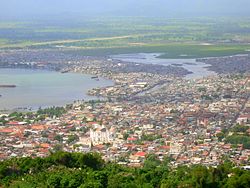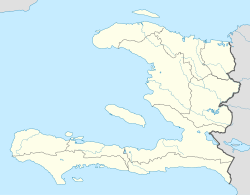Cap Français
Cap-Haïtien
|
|
|---|---|
| Commune | |
 |
|
| Nickname(s): Le Paris des Antilles The Paris of the Antilles |
|
| Location in Haiti | |
| Coordinates: 19°45′36″N 72°12′00″W / 19.76000°N 72.20000°W | |
| Country | Haiti |
| Department | Nord |
| Arrondissement | Cap-Haïtien |
| Founded | 1670 |
| Government | |
| • Mayor | Jean Renaud |
| Area | |
| • Total | 53.5 km2 (20.7 sq mi) |
| Elevation | 0 m (0 ft) |
| Population (March, 2015) | |
| • Total | 274,404 |
| • Density | 5,129/km2 (13,280/sq mi) |
| Demonym(s) | Capois(e) |
| Time zone | Eastern (UTC-5) |
| • Summer (DST) | Eastern (UTC-4) |
| Sister cities |
|---|
| Old San Juan, Puerto Rico |
| Portland, Maine, United States |
| New Orleans, Louisiana, United States |
Cap-Haïtien (Haitian Creole: Kap Ayisyen; English: Cape Haitian) often referred to as Le Cap or Au Cap, is a commune of about 190,000 people on the north coast of Haiti and capital of the department of Nord. Previously named as Cap‑Français, Cap‑Henri and historically known as the Paris of the Antilles, displaying its wealth and sophistication through its beautiful architecture and artistic life. It was an important city during the colonial period, serving as the capital of the French Colony of Saint-Domingue from the city's formal foundation in 1711 until 1770 when the capital was moved to Port-au-Prince. After the Haitian Revolution, it became the capital of the Kingdom of Northern Haiti under King Henri Christophe until 1820.
Cap-Haïtien's long history of independent thought and its relative distance from Port-au-Prince have contributed to making it a legendary incubator of anti-establishment movements. For instance, from February 5–29, 2004, the city was taken over by militants who opposed the rule of the Haïtian president Jean-Bertrand Aristide. They eventually created enough political pressure to force him out of office and the country.
Cap-Haïtien is near the historic Haitian town of Milot, which lies 12 miles (19 km) to the southwest along a gravel road. Milot was Haiti's first capital under the self-proclaimed King Henri Christophe, who ascended to power in 1807, three years after Haiti had gained independence from France. He renamed Cap‑Français as Cap‑Henri. Milot is the site of his Sans-Souci Palace, wrecked by the 1842 earthquake. The Citadelle Laferrière, a massive stone fortress bristling with cannons, atop a nearby mountain is 5 miles (8.0 km) away. On clear days, its silhouette is visible from Cap‑Haïtien.
...
Wikipedia

